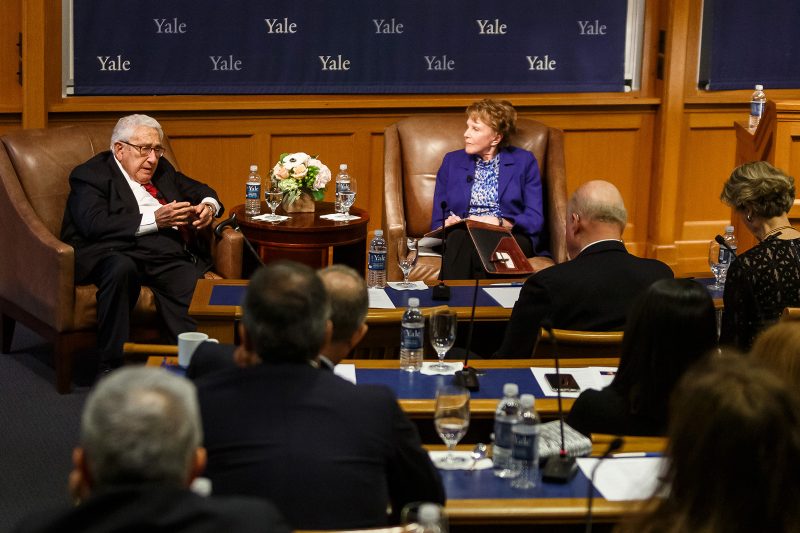The Johnson Center for the Study of American Diplomacy hosted its annual conference, “World Disorder: Future of the International State System” featuring the Honorable Dr. Henry Kissinger on March 31 – April 1, 2019. This was the eighth annual conference of the Johnson Center, which was made possible by Dr. Henry Kissinger’s donation of his papers to Yale and a generous gift from Charles B. Johnson ’54 and Nicholas F. Brady ’52.
As a program of the Jackson Institute for Global Affairs, and in collaboration with International Security Studies and the Brady-Johnson Program in Grand Strategy, the Johnson Center brings prominent statesmen and academics to campus as Kissinger Senior Fellows and Kissinger Visiting Scholars, as well as hosts an annual conference and a variety of other events relating to international affairs.
Yale President Salovey opened the conference on Sunday, March 31, followed by a conversation with Dr. Kissinger, moderated by Margaret Warner, former Chief Global Affairs Correspondent for PBS NewsHour and a current Jackson Senior Fellow.
Participants examined the “liberal world order” forged in the wake of World War II and backed by American security guarantees. Today’s liberal democracies are experiencing growing populism, nationalism, and political polarization across Europe, North and South America. Meanwhile, authoritarian systems in China, Russia, and Turkey have become further entrenched, signaling a return to historical great power rivalries. Countries seem increasingly emboldened to flout the most basic norms of international relations, ranging from the annexation of territory to the proliferation of nuclear weapons. Humanitarian crises have worsened in the Middle East in the absence of coordinated international intervention.
Dr. Kissinger’s most recent book, World Order (2014), traced the roots of international cooperation and conflict from the ancient world to the present day.
On Monday, participants explored the challenges to world order with a focus on the implications for military strategy and planning. In particular, the recently released report of National Defense Strategy Commission, Providing for the Common Defense, starkly warns that U.S. military superiority has eroded to a dangerous degree, drawing into question America’s ability to defend its allies, its partners, and its own vital interests.
Panelists included Ambassador Eric Edelman, Admiral Gary Roughead, and Ambassador Anne Patterson, who served as three of the 12 Commissioners on the report. They offered an analysis of the current threat landscape and the preparedness of the U.S. military to respond. Much of the discussion centered on new technologies, such as artificial intelligence and robotics, and implications for the future of warfare. Amb. Patterson also highlighted the important role of the State Department, how the work of diplomats has changed in recent years, and the impact of budget shortfalls on the department.
Dr. Kissinger offered his reactions to the Commission report and the panelists’ remarks. Ted Wittenstein, executive director of the Johnson Center, served as moderator for the discussion and audience Q&A.
